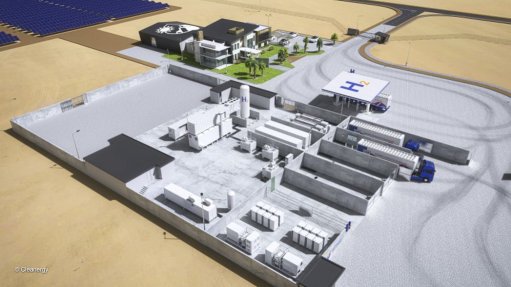
Illustration of green hydrogen pilot plant.
JOHANNESBURG (miningweekly.com) – A green hydrogen pilot plant and refuelling station, to gain scientific insights into upscaling green hydrogen technologies and to ensure a high safety level for the hydrogen economy, is to be built in Nambia, Germany’s Bundesanstalt für Materialforschung und-prüfung (BAM) stated on Thursday.
Germany’s Federal Ministry for Education and Research is providing more than €10-million for the development of the Cleanergy pilot plant near Walvis Bay and has afforded a project budget of €1-million-plus to BAM.
BAM component safety head Prof Dr-Ing Thomas Böllinghaus, who is leading the German side of the project, said the joint research programme would identify innovative materials for welded transport lines, piping systems and storage tanks that would enhance the safety and sustainability of green hydrogen technologies.
Cleanergy has invited BAM and the Namibia Green Hydrogen Institute at the University of Namibia (UNam) to collaborate as research partners.
Completion of the 5 MW pilot plant, which will serve as a testing ground for hydrogen production and handling, as well as associated components and infrastructure, is expected in ten months.
The mission is to lead Namibia's green energy transformation by becoming the foremost producer of green hydrogen, reducing carbon emissions, and driving economic growth using Olthaver & List's solar energy plant and CMB.TECH's expertise in hydrogen and ammonia technologies.
“For this reason, we are ecstatic to collaborate with BAM, supported by UNam and we are grateful to Prof Dr Böllinghaus and his team for their dedication towards driving real transformation in the field and on the subject,” Olthaver & List and Cleanergy Solutions Namibia group manager Eike Krafft stated in a media release to Engineering News & Mining Weekly.
The mutual scientific exchange will be facilitated through a group of doctoral students from Namibia.
Over the course of the next three years, these students will conduct research on materials compatibility.
While most of their research will take place at BAM's competence centre, H2Safety@BAM, part of it will also take place at the pilot plant to facilitate Namibian upscaling as well as the imparting of knowledge to Namibian scientific and technical personnel.